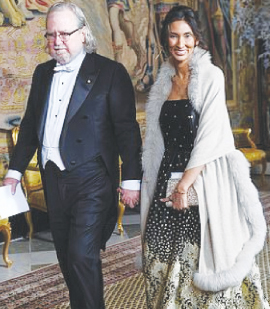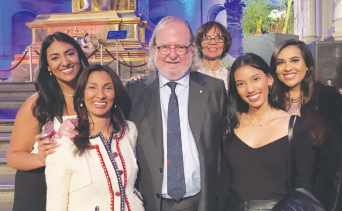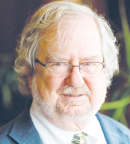
Padmanee Sharma, MD, PhD
Nationally regarded cancer immunologist Padmanee Sharma, MD, PhD, was born and reared in Georgetown, Guyana, on South America’s North Atlantic coast, noted for being the only South American country in which English is the official language. Her parents were descendants of indentured immigrants from India, taken by British colonialists from India and brought to British Guiana to work in conditions not unlike slavery.
Asked about early experiences that influenced her decision to pursue a career in medicine, Dr. Sharma replied, “I had a very serious accident when I was small child. I broke my arm and was in a coma for about a week. Guyana is a very poor country, and I actually had to wait a week for surgery because the clinic didn’t have anesthesia, as it had to be shipped in. At first, they didn’t think I’d regain the use of my arm, but I eventually relearned how to use it. I spent more than a month in the hospital.”
This traumatic experience helped Dr. Sharma see first-hand how doctors care for patients. “I received such good medical care from my doctor and nurses that I wanted to become a physician also, so I could care for sick people,” she explained. “Not only was my doctor a skilled medical professional, he treated me and other patients with such compassion that it had a profound effect on the way I saw the profession. I was there for so long that he let me go on rounds with him, which was also fascinating.”
Giving Back
Dr. Sharma recalled her early life in Guyana, a country that is still struggling with the notion of gender equality. “My grandmother got married when she was 14 years old. It was an arranged marriage, which was common in her generation. Although we’ve seen some advances in Guyana concerning women’s rights, there’s a lot of work ahead.”
I feel like I hit the lottery early on in terms of meeting terrific educators who believed in me and helped me reach my potential.— Padmanee Sharma, MD, PhD
Tweet this quote
Once she reached a certain level of success, Dr. Sharma felt it was important to give back to where she came from. “My husband, Jim Allison, and I have worked with my family to set up a charity called Abraham’s Tent, which helps to educate children in Guyana. We’re currently in the process of fundraising to build a school, which will also include a college scholarship. It’s a lot of work, but it is very rewarding.”
Escaping Political Strife
After Guyana gained independence from Great Britain, the country underwent a series of political and economic convulsions, as various factions vied for control. By the late 1970s, the turmoil that had long plagued Guyana turned violent. In 1980, Dr. Sharma’s parents moved to the United States, settling on metropolitan New York, where Dr. Sharma’s maternal grandmother had moved several years before.

Dr. Sharma with her husband, Dr. James Allison, at the Nobel Prize ceremony.
“I was 10 when we left Guyana, and because of the circumstances, we couldn’t sell our house or bring much of our assets with us. My parents, my brother, and I lived in a small basement apartment in Queens. My parents worked multiple jobs just to make ends meet. Consequently, my brother and I had to be independent, caring for ourselves, getting off to school on our own, and doing our homework. I also had to take care of my younger brother, so there was quite a bit of responsibility at a young age,” shared Dr. Sharma.
Dr. Sharma excelled in school, catching the attention of her teachers. When she was 14 years old, she entered Hillcrest High School in Queens and was accepted to the school’s premed program. She loved math and biology and took advantage of summer courses and hospital placements.
“After high school, I went to Boston University to study biology. When I was there, I had the opportunity to join a research laboratory at Dana-Farber Cancer Institute, looking at the signaling pathways of T cells. I fell in love with research and knew I wanted to pursue a career in immunology,” said Dr. Sharma.
A Paper Leads to Opportunity
In 1991, after receiving her undergraduate and master’s degrees from Boston University, Dr. Sharma entered Pennsylvania State University, College of Medicine, Hershey, to begin her medical training and her doctorate in immunology. After receiving her doctorate in 1998, she did a clinical residency in internal medicine at New York Hospital, affiliated with Cornell Medical Center.
“During my residency, I wanted to get back into the lab. As it turned out, one of my PhD papers was on thymus-leukemia antigen, which Lloyd Old had first identified in the late 1960s. He’d read the paper and invited me to do a postdoctoral fellowship in his laboratory at Memorial Sloan Kettering Cancer Center (MSK). I was excited about the offer but had to postpone it until I finished my residency and resolved some other issues. After finding a way to fast-track my residency, I started my oncology fellowship and postdoctoral work at MSK in 2000.”
NAME
Padmanee Sharma, MD, PhD
TITLE
Professor, Department of Genitourinary Medical Oncology, Division of Cancer Medicine, The University of Texas MD Anderson Cancer Center, Houston
MEDICAL DEGREE
MD, PhD, Pennsylvania State University College of Medicine, Hershey
NOTABLE HONORS
William B. Coley Award in Tumor Immunology, Cancer Research Institute (2018)
Emil Frei III Award for Excellence in Translational Research (2016)
MD Anderson Cancer Center, Team Science Award (2013)
National Institute of Health R01 Award (2012)
MD Anderson Cancer Center, Faculty Scholar Award (2012)
MD Anderson Women Faculty Programs, “Woman Leading the Way” (2012)
Cancer Prevention Research Institute of Texas, Independent Investigator Award (2011)
American Cancer Society, Mentored Research Scholar Grant (2009)
MD Anderson Cancer Center Prostate Cancer SPORE Development Award (2009)
Melanoma Research Alliance, Young Investigator Award (2008)
Doris Duke, Clinical Scientist Development Award (2008)
“I had incredible mentors at MSK who encouraged me to push the limits of my research goals,” said Dr. Sharma. “I also am thankful that I had great teachers in high school who pushed me to reach goals that became valuable stepping stones in my career. I feel like I hit the lottery early on in terms of meeting terrific educators who believed in me and helped me reach my potential. Mentoring is an invaluable tool in shaping peoples’ careers. I just hope that I’m doing it equally well for my students.”
In 2003, while at MSK, Dr. Sharma received an ASCO Young Investigator Award for her project; it involved looking for particular tumor antigens in blood and tumor samples taken from patients with bladder cancer undergoing surgery. She found that some bladder cancers expressed NY-ESO-1, a marker that provided an ideal target for developing a protein vaccine to stimulate the immune system’s T cells to mount an attack on both bladder and other cancers.
At MD Anderson
Although her work at MSK was exciting, she received an offer from MD Anderson Cancer Center and jumped at it. “I took my faculty position at MD Anderson in 2004 in the genitourinary medical oncology department. In 2005, I was awarded the Physician Scientist Training Program Award, so I had strong support to have a lab in immunology. And I’ve been here ever since, going up the ranks to full professor with tenure and running an exciting immunotherapy program. As we know, immunotherapy has come a long way since I was doing my PhD work in T cells. Now we’ve arrived at a point where everyone thinks immunology is cool!” said Dr. Sharma.
In 2018, Dr. Sharma was awarded the William B. Coley Award in Tumor Immunology by the Cancer Research Institute. Asked to reflect on her decision to pursue immunology Dr. Sharma said, “I did my first immunology course in 1988 and was just fascinated with T cells. To me, they were like the body’s super heroes, and it wasn’t something out of a comic book; it was reality. It was the reason I did my master’s work and then pursued my PhD in immunology.”

Dr. Sharma with her husband, Dr. James Allison, her three daughters, and her mom.
In 1990, Dr. Sharma joined an immunology lab for her PhD and postdoctoral work. “I was involved in immunology in the early days of its coming of age,” she stated. “I still remember Lloyd Old’s enthusiasm as he spoke about harnessing the incredible power of the immune system. And it’s been an incredibly exciting journey.”
Among numerous achievements, Dr. Sharma was the first researcher to design and conduct a presurgical trial, also known as a window of opportunity trial, using an immunotherapy drug anticytotoxic T-lymphocyte–associated protein 4 [anti–CTLA-4], which was not yet approved by the U.S. Food and Drug Administration to interrogate the biologic impact of the drug on the immune response within the tumor microenvironment of patients with localized bladder cancer who were scheduled for radical
Immunotherapy has come a long way since I was doing my PhD work in T cells. Now we’ve arrived at a point where everyone thinks immunology is cool!— Padmanee Sharma, MD, PhD
Tweet this quote
cystectomy. Dr. Sharma was the first investigator to demonstrate that anti–CTLA-4 therapy increases the occurrence of T cells that express the co-stimulator (ICOS) protein. Her work showed that ICOS-positive T cells were essential for optimal killing of tumor cells. Her subsequent experiments with transgenic mice showed that the ICOS molecule and its ligand are crucial players in optimizing the antitumor responses mediated by the anti–CTLA-4 antibody. These types of studies, from the clinic and then to the lab, have been termed “reverse translation” by Dr. Sharma, as she continues to design and conduct innovative clinical trials in patients, which then lead to subsequent investigations in murine models in the lab, to investigate response and resistance mechanisms associated with immunotherapy.
A Day in the Life of a Researcher
Dr. Sharma’s busy schedule begins with meetings, discussing clinical trial protocols. “My clinic day is Tuesday, and I see patients with genitourinary cancers. On my non-clinic days, after meetings, I spend most of my time in the laboratory. I oversee two labs, one of which is my own, where I work with my postdoc associates, reviewing the progress of their work and writings,” she explained.
She continued: “Then there’s the immunotherapy platform. I’m Scientific Director andmy husband Jim Allison is Executive Director. The platform has about 113 ongoing clinical trials across 18 various departments at MD Anderson. We review data with the investigators and make decisions. We’ve devised an approach to monitor tumors in various stages of treatment. This involves analyzing tissues taken from patients before and after treatment to pinpoint exactly why some patients respond to immunotherapy and some do not. This work is vital to the design of better treatment in the future,” explained Dr. Sharma.

Dr. Sharma and family at a U2 concert with lead guitarist “The Edge”
Dr. Sharma also conducts numerous teleconferences with industry, coordinating various joint efforts. “My days are long and very filled, but I must say, they pass by quickly because I totally love my work. I feel like we’re right on the cutting edge of discoveries that will create incredibly good outcomes for our patients with cancer, and knowing that drives me to keep pushing the envelope in immunotherapy.”
“Finally, people can see that what we’ve been saying for all these years about immunotherapy is correct,” she emphasized. “But more important, we can now deliver the hope to patients that we’ve been working so hard for. I’m blessed to be at MD
I feel like we’re right on the cutting edge of discoveries that will create incredibly good outcomes for our patients with cancer.— Padmanee Sharma, MD, PhD
Tweet this quote
Anderson, a place that gives us a platform and a voice to encourage the advancement of this field. Jim and I do a lot of interviews about the success of our work and Jim’s Nobel Prize. However, the truth of the matter for us is that we wake up each day thinking about novel ideas about how to try to raise the tail on the survival curve. The next step is finding new ways to integrate immunotherapies as effective combination strategies into the full armamentarium of cancer therapies for as many patients as possible.”
Passion Equals Balance
Asked about balancing her professional and personal lives, Dr. Sharma replied, “I have three children and love being a mom, but I also love being in the lab and seeing patients. I’m passionate about all parts of my life, and it’s important to realize there is no magic formula to balance, it’s whatever works for you, and sometimes you have to spend time figuring that out. But being passionate about your work certainly goes a long way toward finding a balance in life.” ■


